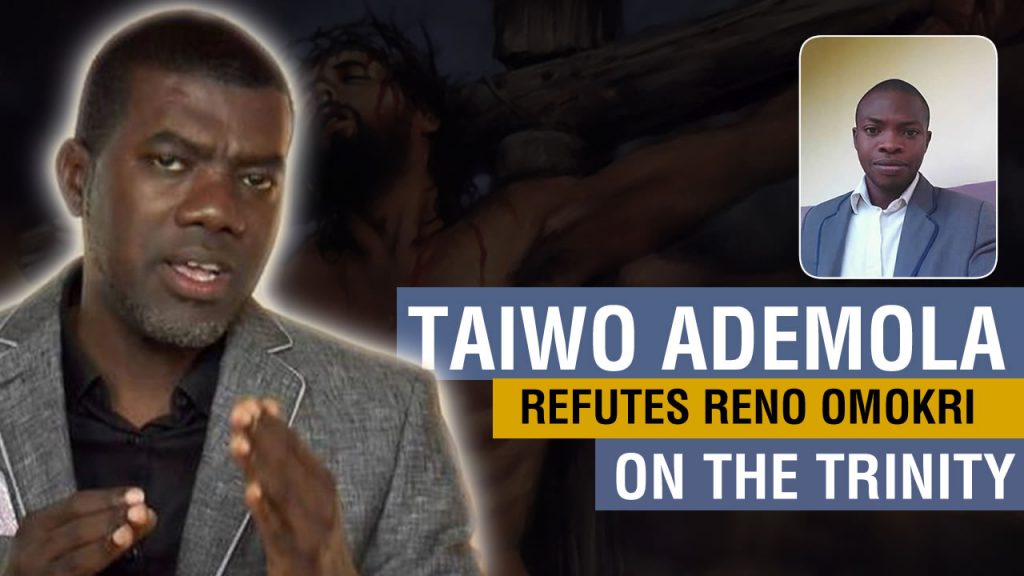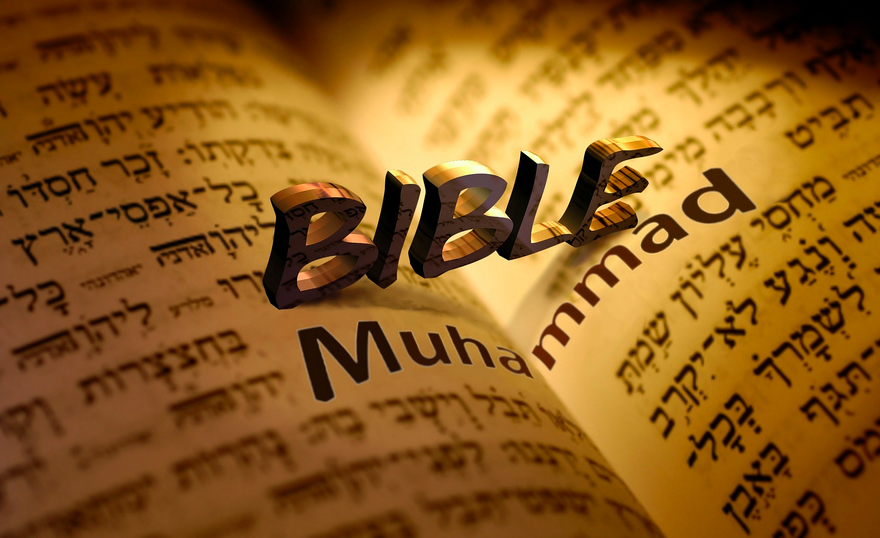To the more important of Reno Omokri’s assertion, Reno Omokri:
“The Trinity has not always existed. For the first 300 years of Christianity, there was nothing like the Trinity. The word does not exist in the Holy Scriptures. It was introduced by the Holy Roman Catholic Church during the First Council of Nicaea in the year 325 AD’.
I am supposing that Reno Omokri either have never come across the pre-nicean Fathers writings or that he didn’t take his research as seriously as to contact the expanse of literature scholars that’s been written on the subject. Here is why, the Trinity was merely not more than a name given to a concept of the triune nature of God as clearly taught in scriptures. Just like Tawhid (the concept of the oneness) of Allah is taught in the Qur’an without so much as a single mention of that word in the Qur’an, so is the Trinity well taught in the Christian scriptures. To address his point about how the concept of the Trinity is foreign until the fourth century. Here are citations of the church Fathers of between late first to third century:
IGNATIUS (A.D 30–107)
Since, also, there is but one unbegotten Being, God, even the Father; and one only-begotten Son, God, the Word and man; and one Comforter, the Spirit of truth; and also one preaching, and one faith, and one baptism;
The Epistle of Ignatius to the Philadelphians Chapter IV
But the Holy Spirit does not speak His own things, but those of Christ, and that not from himself, but from the Lord; even as the Lord also announced to us the things that He received from the Father. For, says He, “the word which ye hear is not Mine, but the Father’s, who sent Me.” And says He of the Holy Spirit, “He shall not speak of Himself, but whatsoever things He shall hear from Me.” And He says of Himself to the Father, “I have,” says He, “glorified Thee upon the earth; I have finished the work which, Thou gavest Me; I have manifested Thy name to men.” And of the Holy Ghost, “He shall glorify Me, for He receives of Mine.”
The Epistle of Ignatius to the Ephesians Chapter IX
For if there is one God of the universe, the Father of Christ, “of whom are all things;” and one Lord Jesus Christ, our [Lord], “by whom are all things;” and also one Holy Spirit, who wrought in Moses, and in the prophets and apostles;
The Epistle of Ignatius to the Philippians Chapter I
JUSTIN MARTYR (A.D 110–165)
For, in the name of God, the Father and Lord of the universe, and of our Saviour Jesus Christ, and of the Holy Spirit, they then receive the washing with water.
The First Apology Chapter LXI
IRENEAUS (A.D 120–202)
The Church, though dispersed through our the whole world, even to the ends of the earth, has received from the apostles and their disciples this faith: [She believes] in one God, the Father Almighty, Maker of heaven, and earth, and the sea, and all things that are in them; and in one Christ Jesus, the Son of God, who became incarnate for our salvation; and in the Holy Spirit, who proclaimed through the prophets the dispensations of God, and the advents, and the birth from a virgin, and the passion, and the resurrection from the dead, and the ascension into heaven in the flesh of the beloved Christ Jesus, our Lord, and His [future] manifestation from heaven in the glory of the Father “to gather all things in one,” . . .
Against Heresies Book I Chapter X
The rule of truth which we hold, is, that there is one God Almighty, who made all things by His Word, and fashioned and formed, out of that which had no existence, all things which exist. Thus saith the Scripture, to that effect “By the Word of the Lord were the heavens established, and all the might of them, by the spirit of His mouth.” And again, “All things were made by Him, and without Him was nothing made.” There is no exception or deduction stated; but the Father made all things by Him, whether visible or invisible, objects of sense or of intelligence, temporal, on account of a certain character given them, or eternal; and these eternal things He did not make by angels, or by any powers separated from His Ennœa.
For God needs none of all these things, but is He who, by His Word and Spirit, makes, and disposes, and governs all things, and commands all things into existence,—He who formed the world (for the world is of all),—He who fashioned man,—He [who] is the God of Abraham, and the God of Isaac, and the God of Jacob, above whom there is no other God, nor initial principle, nor power, nor pleroma,—He is the Father of our Lord Jesus Christ, as we shall prove.
Book I Chapter XXII
Therefore neither would the Lord, nor the Holy Spirit, nor the apostles, have ever named as God, definitely and absolutely, him who was not God, unless he were truly God; nor would they have named any one in his own person Lord, except God the Father ruling over all, and His Son who has received dominion from His Father over all creation, as this passage has it: “The Lord said unto my Lord, Sit Thou at my right hand, until I make Thine enemies Thy footstool.” Here the [Scripture] represents to us the Father addressing the Son; He who gave Him the inheritance of the heathen, and subjected to Him all His enemies. Since, therefore, the Father is truly Lord, and the Son truly Lord, the Holy Spirit has fitly designated them by the title of Lord.
Against Heresies Book III Chapter VI
For with Him were always present the Word and Wisdom, the Son and the Spirit, by whom and in whom, freely and spontaneously, He made all things, to whom also He speaks, saying, “Let Us make man after Our image and likeness;” He taking from Himself the substance of the creatures [formed], and the pattern of things made, and the type of all the adornments in the world.
Against Heresies Book IV Chapter XX
CLEMENT OF ALEXENDRIA (A.D. 153–217)
O mystic marvel! The universal Father is one, and one the universal Word; and the Holy Spirit is one and the same everywhere, . . .
The Instructor. Book I Chapter VI
TERTULLIAN (A.D. 145–220)
In the course of time, then, the Father forsooth was born, and the Father suffered, God Himself, the Lord Almighty, whom in their preaching they declare to be Jesus Christ. We, however, as we indeed always have done (and more especially since we have been better instructed by the Paraclete, who leads men indeed into all truth), believe that there is one only God, but under the following dispensation, or οἰκονομία , as it is called, that this one only God has also a Son, His Word, who proceeded from Himself, by whom all things were made, and without whom nothing was made. Him we believe to have been sent by the Father into the Virgin, and to have been born of her—being both Man and God, the Son of Man and the Son of God, and to have been called by the name of Jesus Christ; we believe Him to have suffered, died, and been buried, according to the Scriptures, and, after He had been raised again by the Father and taken back to heaven, to be sitting at the right hand of the Father, and that He will come to judge the quick and the dead; who sent also from heaven from the Father, according to His own promise, the Holy Ghost, the Paraclete, the sanctifier of the faith of those who believe in the Father, and in the Son, and in the Holy Ghost.
But keeping this prescriptive rule inviolate, still some opportunity must be given for reviewing (the statements of heretics), with a view to the instruction and protection of divers persons; were it only that it may not seem that each perversion of the truth is condemned without examination, and simply prejudged; especially in the case of this heresy, which supposes itself to possess the pure truth, in thinking that one cannot believe in One Only God in any other way than by saying that the Father, the Son, and the Holy Ghost are the very selfsame Person. As if in this way also one were not All, in that All are of One, by unity (that is) of substance; while the mystery of the dispensation is still guarded, which distributes the Unity into a Trinity, placing in their order the three Persons—the Father, the Son, and the Holy Ghost: three, however, not in condition, but in degree; not in substance, but in form; not in power, but in aspect; yet of one substance, and of one condition, and of one power, inasmuch as He is one God, from whom these degrees and forms and aspects are reckoned, under the name of the Father, and of the Son, and of the Holy Ghost. How they are susceptible of number without division, will be shown as our treatise proceeds.Against Praxeas Chapter II
The simple, indeed, (I will not call them unwise and unlearned,) who always constitute the majority of believers, are startled at the dispensation (of the Three in One), on the ground that their very rule of faith withdraws them from the world’s plurality of gods to the one only true God; not understanding that, although He is the one only God, He must yet be believed in with His own οἰκονομία . The numerical order and distribution of the Trinity they assume to be a division of the Unity; whereas the Unity which derives the Trinity out of its own self is so far from being destroyed, that it is actually supported by it. They are constantly throwing out against us that we are preachers of two gods and three gods, while they take to themselves pre-eminently the credit of being worshippers of the One God; just as if the Unity itself with irrational deductions did not produce heresy, and the Trinity rationally considered constitute the truth.
Against Praxeas Chapter III
But as for me, who derive the Son from no other source but from the substance of the Father, and (represent Him) as doing nothing without the Father’s will, and as having received all power from the Father, how can I be possibly destroying the Monarchy from the faith, when I preserve it in the Son just as it was committed to Him by the Father? The same remark (I wish also to be formally) made by me with respect to the third degree in the Godhead, because I believe the Spirit to proceed from no other source than from the Father through the Son.
Against Praxeas Chapter IV
.
ORIGEN (A.D 185–254)
From all which we learn that the person of the Holy Spirit was of such authority and dignity, that saving baptism was not complete except by the authority of the most excellent Trinity of them all, i.e., by the naming of Father, Son, and Holy Spirit, and by joining to the unbegotten God the Father, and to His only-begotten Son, the name also of the Holy Spirit.
. . .
Nevertheless it seems proper to inquire what is the reason why he who is regenerated by God unto salvation has to do both with Father and Son and Holy Spirit, and does not obtain salvation unless with the co-operation of the entire Trinity; and why it is impossible to become partaker of the Father or the Son without the Holy Spirit.Origen De Principiis. Book I Chapter III
But in our desire to show the divine benefits bestowed upon us by Father, Son, and Holy Spirit, which Trinity is the fountain of all holiness, we have fallen, in what we have said, into a digression, having considered that the subject of the soul, which accidentally came before us, should be touched on, although cursorily, seeing we were discussing a cognate topic relating to our rational nature. We shall, however, with the permission of God through Jesus Christ and the Holy Spirit, more conveniently consider in the proper place the subject of all rational beings, which are distinguished into three genera and species.
Origen De Principiis. Book I Chapter IV
.For the end is always like the beginning: and, therefore, as there is one end to all things, so ought we to understand that there was one beginning; and as there is one end to many things, so there spring from one beginning many differences and varieties, which again, through the goodness of God, and by subjection to Christ, and through the unity of the Holy Spirit, are recalled to one end, which is like unto the beginning: all those, viz., who, bending the knee at the name of Jesus, make known by so doing their subjection to Him: and these are they who are in heaven, on earth, and under the earth: by which three classes the whole universe of things is pointed out, those, viz., who from that one beginning were arranged, each according to the diversity of his conduct, among the different orders, in accordance with their desert; for there was no goodness in them by essential being, as in God and His Christ, and in the Holy Spirit. For in the Trinity alone, which is the author of all things, does goodness exist in virtue of essential being; while others possess it as an accidental and perishable quality, and only then enjoy blessedness, when they participate in holiness and wisdom, and in divinity itself.
Origen De Principiis. Book I Chapter VI
E.T.C.
Some of the church Leaders who lived before the Nicea council used the phrase, “Holy Trinity, Blessed Trinity, Trinity……hence showing that the phrase, and even trinity as a doctrine existed not only before NICEA council, but also had been widely known and accepted in different churches based on the geography of this church Leaders using same phrase and making similar cases.
Think about it, Ireneaus of Lyon was from France, Tertullian of Carthage was from Africa, Clement of Rome was from Italy, Alexander, Bishop of Alexandria was from Egypt. This goes on to show that, the doctrine would’ve been well established before NICEA council as evidenced from witnesses from different geographical locations. Perhaps, Reno needs to look things up for himself and go to real scholars to ascertain the truth and not be misled by online polemics whose only business is distortion of fact.
.
Now we look at the passages put up by Reno Omokri, which according to him, negates Trinitarianism:
“In John 14:28 The Son said “My Father is greater than I.” Obviously, that verse contradicts the first leg of the Trinity. During my investigations, I confronted a member of the US Southern Baptist Convention about this and I will quote his response verbatim. He said “Jesus was just being modest”. Almighty God is omniscient. He knows all things. But is His Son omniscient? In Matthew 24:36, The Son said “”But about that day or hour no one knows, not even the angels in heaven, NOR THE SON, but only the Father.”
I suppose that Pastor Reno never really consult the text as he should have. By the phrase, ‘the Father is greater than I am’, Jesus means no such thing as saying, “I am not God’. That’s reading into the text what isn’t their. By that, Jesus meant that God the Father, is positionally superior to him. The doctrine of positional superiority in the Godhead isn’t supposed to be hard for anyone that understands concept of order in the institution of marriage. Man and woman are one flesh, yet, the husband is taught to rank above his wife in affairs of the house. Does that make the woman less a human than the man? Certainly not. She is human just as the husband is human too. This applies also in the concept of the Godhead.
Meanwhile, Jesus’s declaration that he doesn’t know the time implies his humanity WHILE ON EARTH, not after the ascension. It was after the ascension that he used such term as “all power in heaven and earth has been given to him’, “I am the Alpha and the Omega’, unlike while on earth when he would say, “Glorify me with the glory which I have with you from the foundation of this world’. That again points to the differences in the persons in the Trinity and not that Jesus isn’t God.
Pending when I will make robust biblical case for the doctrine of the Trinity, with due response to the various objections against it, I will advise Mr/Pastor Reno Omokri to please consult scholarly materials of real scholars who have fairly dealt with this stuff. Here are some of the names to check out: Williams Lane Craig, Michael Licona, James White, Michael Kruger, Larry Lurtado, and a host of others. He will really need those for the reconsideration of his Arian stance.




I am highly inspired and more strengthened in the Faith by this piece. Thanks and God bless you
We are glad you are, you can check bro. Taiwo’s article on the name Jesus as well.
Good job amigo
This is an excellent piece and Reno Omokri has got to read this wonderful article. I pray the Lord open his eyes of understanding.
Amen!